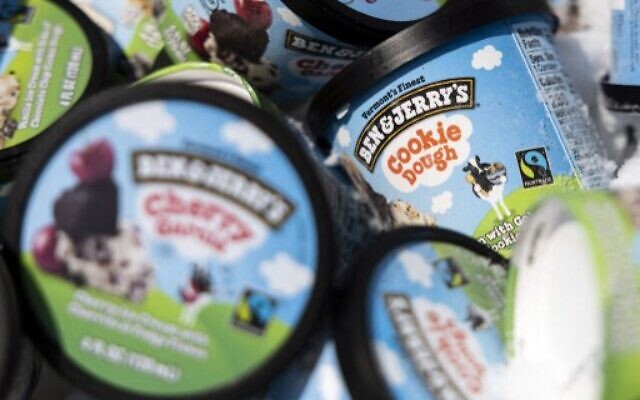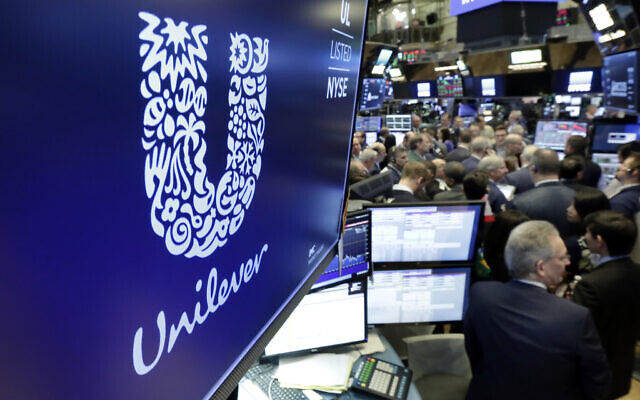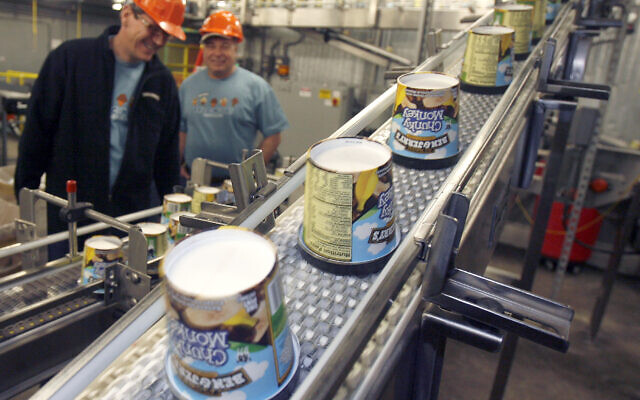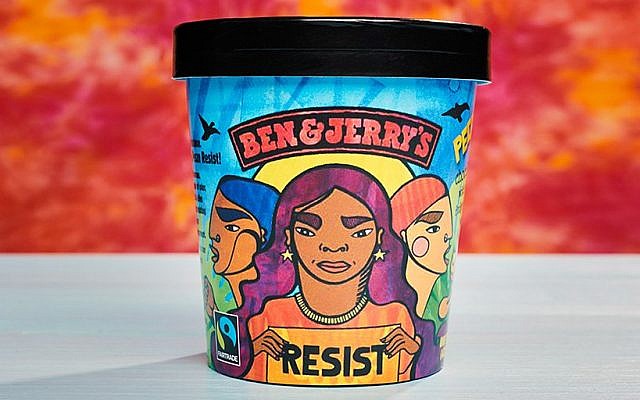As ice cream giant announces settlement boycott, Unilever vows Ben & Jerry’s will stay in Israel. But chairman says this was not agreed and owners had no authority to make promise

A statement Monday by Ben & Jerry’s that it will no longer distribute its products in the “Occupied Palestinian Territory” but will remain in Israel was released by owners Unilever without consulting with the ice cream maker’s board — who had intended to put out a different statement that made no mention of committing to continue doing business with the Jewish state, Ben & Jerry’s chairman Anuradha Mittal told NBC News.
While many companies and countries have differentiated between Israel and its settlements in the West Bank, a complete boycott of Israel by a major Western company is almost unprecedented in recent years.
Mittal said the board had been pushing for years to stop selling its products in settlements and intended to release a different statement. NBC, which reviewed the statement, said it made no mention of remaining in Israel and focused on Ben & Jerry’s commitment to social justice causes.
Mittal did not rule out the company doing business in Israel in the future with a different distributor but said such a decision would have to be agreed upon by the board and that Unilever had no right to make the commitment on behalf of Ben & Jerry’s.
Mittal accused Unilever, the European consumer-product giant that bought Ben & Jerry’s in 2000, of violating the purchase agreement that allowed the company to maintain control over its social mission, brand integrity and policies and implied that the decision to ignore the will of the board was racist and sexist.
“I am saddened by the deceit of it,” Mittal told NBC News. “This is not about Israel; it is about the violation of the acquisition agreement that maintained the soul of the company,” Mittal said. “I can’t stop thinking that this is what happens when you have a board with all women and people of color who have been pushing to do the right thing.”
“The statement released by Ben & Jerry’s regarding its operation in Israel and the Occupied Palestinian Territory (the OPT) does not reflect the position of the independent board, nor was it approved by the independent board,” said the board in a separate statement to NBC. “By taking a position and publishing a statement without the approval of the independent board on an issue directly related to Ben & Jerry’s social mission and brand integrity, Unilever and its CEO at Ben & Jerry’s are in violation of the spirit and the letter of the acquisition agreement.”
Mittal also said that the board had passed a resolution to end sales of Ben & Jerry’s products in Israeli settlements last July, but that the company’s CEO Matthew McCarthy, appointed by Unilever in 2018, “never operationalized it.”
“They are trying to destroy the soul of the company,” Mittal said.“We want this company to be led by values and not be dictated by the parent company.”
Unilever, which has a very large presence in Israel, later released a separate statement expressing its commitment to its presence in Israel. It did not mention the dispute with the Ben & Jerry’s board.
“The Israeli-Palestinian conflict is a very complex and sensitive situation. As a global company, Unilever’s brands are available in more than 190 countries and in all of them, our priority is to serve consumers with essential products that contribute to their health, wellbeing and enjoyment,” Unilever said. “We remain fully committed to our presence in Israel, where we have invested in our people, brands and business for several decades.”

“Ben & Jerry’s was acquired by Unilever in 2000. As part of the acquisition agreement, we have always recognized the right of the brand and its independent Board to take decisions about its social mission. We also welcome the fact that Ben & Jerry’s will stay in Israel,” Unilever said.
The original statement put out by Unilever on behalf of Ben & Jerry said: “We believe it is inconsistent with our values for Ben & Jerry’s ice cream to be sold in the Occupied Palestinian Territory (OPT). We also hear and recognize the concerns shared with us by our fans and trusted partners.”
“We have a longstanding partnership with our licensee, who manufactures Ben & Jerry’s ice cream in Israel and distributes it in the region. We have been working to change this, and so we have informed our licensee that we will not renew the license agreement when it expires at the end of next year,” it said.
However, the company said it would continue to supply its ice cream inside Israel, albeit through a different distributor.
“Although Ben & Jerry’s will no longer be sold in the OPT, we will stay in Israel through a different arrangement. We will share an update on this as soon as we’re ready,” the statement added.
Ben & Jerry’s will end sales of our ice cream in the Occupied Palestinian Territory. Read our full statement: https://t.co/2mGWYGN4GA pic.twitter.com/kFeu7aXOf3
— Ben & Jerry's (@benandjerrys) July 19, 2021
Israel captured the West Bank from Jordan in the 1967 Six Day War, and today, more than 400,000 Israeli settlers live there. Most of the international community considers the settlements illegal and an impediment to the creation of an independent Palestinian state. Israel sees the territory as disputed and says the fate of the settlements must be resolved in peace negotiations with the Palestinians.
It was not immediately clear if the boycott also applied to East Jerusalem. Israel annexed East Jerusalem, including the Old City and its holy sites, and considers the whole city the undivided capital of the Jewish state. The Palestinians claim the eastern part as the capital of a future state, and the international community sees Israeli neighborhoods there as settlements, a designation Israel disputes.
Ben & Jerry’s current Israel distributor condemned the ice cream company’s decision to drop its licensing agreement with them.

“The decision is entirely unacceptable. Ben & Jerry’s International decided not to renew their agreement with us in a year and a half, after we refused their demand to stop distribution throughout Israel,” it said. “We urge the Israeli government and consumers — don’t let them boycott Israel.”
“Keep ice cream out of politics,” it added.
The distributor, which has produced special flavors for Jewish holidays, such as haroset for Passover and Israeli election-themed flavors, urged Israelis to buy locally produced ice cream instead.
Prime Minister Naftali Bennett released a statement saying that the decision was a mistake.
“Ben & Jerry’s decided to brand itself as anti-Israel ice cream,” said Bennett. “This is a moral mistake and I believe it will turn out to be a business mistake as well.”
“The boycott against Israel… reflects that they have totally lost their way. The boycott doesn’t work and won’t work and we will fight it with all our might,” the prime minister added.
Foreign Minister Yair Lapid also condemned Ben & Jerry’s’ decision, calling it “a disgraceful capitulation to antisemitism, to BDS [the Boycott, Divestment and Sanctions movement against Israel], to all that is evil in the anti-Israeli and anti-Jewish discourse.”
The foreign minister said he would ask the over 30 US states with anti-BDS laws to implement them against Ben & Jerry’s in retaliation. The laws require states to divest from companies that boycott Israel.
“We won’t be silent,” he insisted.
Opposition leader Benjamin Netanyahu also weighed in. “Now we Israelis know which ice cream NOT to buy,” he wrote on Twitter.
Now we Israelis know which ice cream NOT to buy 🇮🇱💪 https://t.co/j7VNpIWX0f
— Benjamin Netanyahu (@netanyahu) July 19, 2021
Ben & Jerry’s statement did not explicitly identify the concerns that led to the decision, but last month, a group called Vermonters for Justice in Palestine called on the company to “end complicity in Israel’s occupation and abuses of Palestinian human rights.”
“How much longer will Ben & Jerry’s permit its Israeli-manufactured ice cream to be sold in Jewish-only settlements while Palestinian land is being confiscated, Palestinian homes are being destroyed, and Palestinian families in neighborhoods like Sheik Jarrah are facing eviction to make way for Jewish settlers?” the organization’s Ian Stokes said in a June 10 news release.
In a Monday statement, the organization said Ben & Jerry’s actions did not go far enough.
“By maintaining a presence in Israel, Ben & Jerry’s continues to be complicit in the killing, imprisonment and dispossession of Palestinian people and the flaunting of international law,” said the Vermont group’s Kathy Shapiro.

Ben & Jerrys ‘Pecan Resist’ ice-cream launched October 2018. (Ben & Jerrys)Founded in Vermont in 1978, but currently owned by consumer goods conglomerate Unilever, Ben & Jerry’s has not shied away from social causes. While many businesses tread lightly in politics for fear of alienating customers, the ice cream maker has taken the opposite approach, often espousing progressive causes.
Ben & Jerry’s took a stand against what it called the Trump administration’s regressive policies by rebranding one of its flavors Pecan Resist in 2018, ahead of midterm elections.
The company said Pecan Resist celebrated activists who were resisting oppression, harmful environmental practices and injustice. As part of the campaign, Ben & Jerry’s said it was giving $25,000 each to four activist entities.
As reported by The Times of Israel
